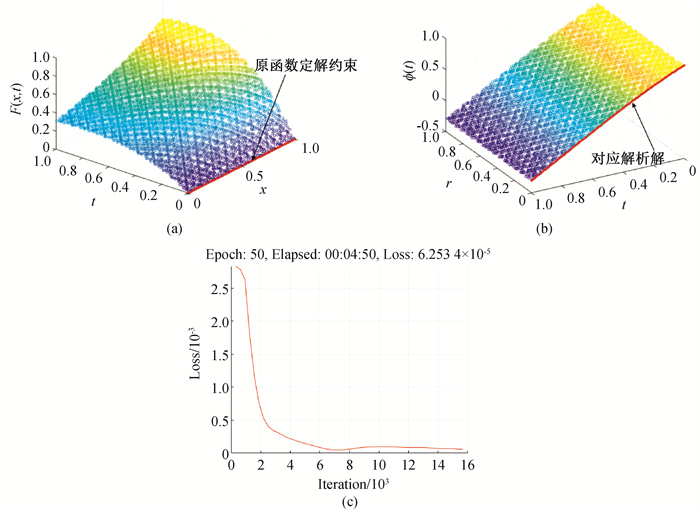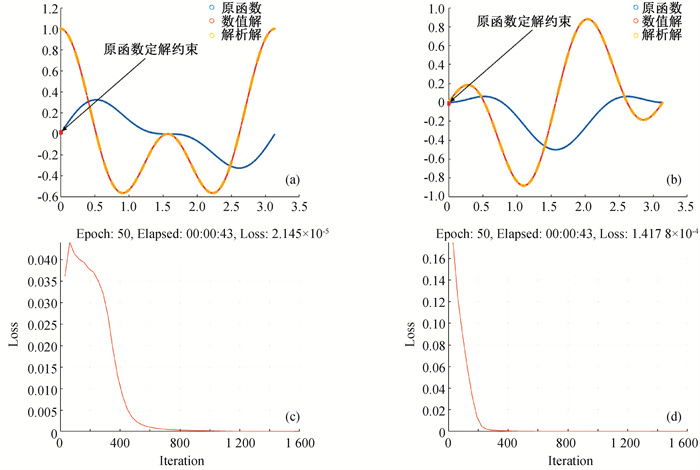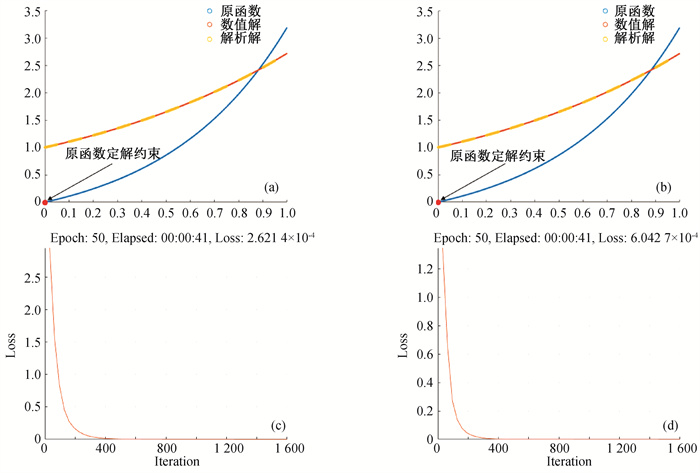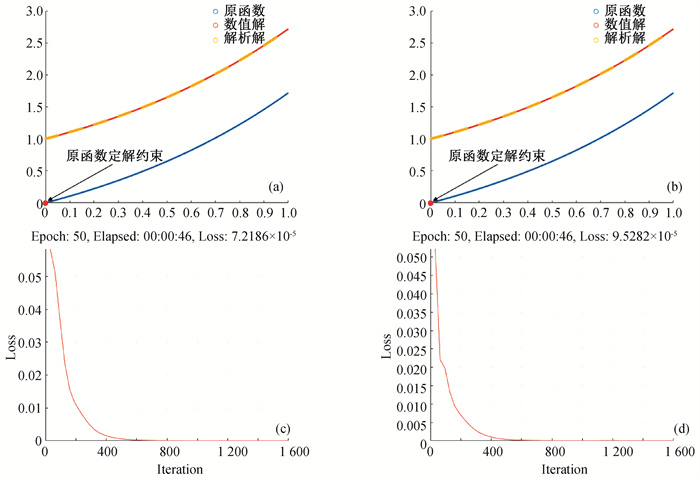Chinese Journal of Computational Physics ›› 2024, Vol. 41 ›› Issue (5): 651-662.DOI: 10.19596/j.cnki.1001-246x.8813
• Research Reports • Previous Articles Next Articles
Dong LIU1,2,3( ), Qilong CHEN1,2, Xueqiang WANG1,2
), Qilong CHEN1,2, Xueqiang WANG1,2
Received:2023-08-07
Online:2024-09-25
Published:2024-09-14
CLC Number:
Dong LIU, Qilong CHEN, Xueqiang WANG. Deep Learning Method for Solving Linear Integral Equations Through Primitive Function Transformation[J]. Chinese Journal of Computational Physics, 2024, 41(5): 651-662.
Add to citation manager EndNote|Ris|BibTeX
URL: http://www.cjcp.org.cn/EN/10.19596/j.cnki.1001-246x.8813
| 损失函数类型 | 约束形式 | 样本数量 | 样本生成方式 | 损失函数权重 | σMSE/10-8 | σMSE, max/10-6 | Loss/10-8 |
| 控制方程Ff-loss | 方程(16) | 5 000 | 随机分布 | Pf= 1 | 2.169 4 | 6.105 1 | 2.239 1 |
| 原函数定解约束Fd-loss | t=0, F0(x, 0) = 0 | 150 | 固定 | Pd =50 |
Table 1 Loss function, sample generation method and numerical operation results of the first kind of Volterra equation
| 损失函数类型 | 约束形式 | 样本数量 | 样本生成方式 | 损失函数权重 | σMSE/10-8 | σMSE, max/10-6 | Loss/10-8 |
| 控制方程Ff-loss | 方程(16) | 5 000 | 随机分布 | Pf= 1 | 2.169 4 | 6.105 1 | 2.239 1 |
| 原函数定解约束Fd-loss | t=0, F0(x, 0) = 0 | 150 | 固定 | Pd =50 |

Fig.2 Numerical results of the first kind Volterra equation (a) scatterplot of the original function distribution of ascending order; (b) scatterplot of distribution of numerical solution of equation; (c) Fall-loss trend graph with time (first 50 times)
| 损失函数类型 | 约束形式 | 样本数量 | 样本生成方式 | 损失函数权重 | σMSE/10-8 | σMSE, max/10-7 | Loss/10-8 |
| 控制方程Ff-loss | 方程(9) | 5 000 | 随机分布 | 1 | 1.251 5 | 7.841 6 | 2.683 0 |
| 原函数确定解约束Fd-loss | t=0, F0(x, 0)=0 | 150 | 固定 | 50 |
Table 2 Loss function, sample generation method and numerical operation results of the second type of Fredholm equation
| 损失函数类型 | 约束形式 | 样本数量 | 样本生成方式 | 损失函数权重 | σMSE/10-8 | σMSE, max/10-7 | Loss/10-8 |
| 控制方程Ff-loss | 方程(9) | 5 000 | 随机分布 | 1 | 1.251 5 | 7.841 6 | 2.683 0 |
| 原函数确定解约束Fd-loss | t=0, F0(x, 0)=0 | 150 | 固定 | 50 |

Fig.3 Numerical results ot the second kind Fredholm equation (a) scatterplot of the original function distribution of ascending order; (b) scatterplot of distribution of the numerical solution of the equation; (c) Fall-loss trend graph with time (first 50 times)
| 损失函数来源 | 约束形式 | 样本数量 | 样本生成方式 | 损失函数权重 | σMSE/10-8 | σMSE, max/10-6 | Loss/10-9 |
| 控制方程Ff-loss-1; Ff-loss-2 | 方程(17)、(18) | 1 000 | 随机分布 | 1 | 6.006 3( | 6.284 1( | 28.289( |
| 原函数定解约束Fd-loss-1; Fd-loss-2 | t1=0, F01(0)=0;t2=0, F02(0)=0 | 1 | 固定 | 30 | 4.906 7( | 9.261 8( | 7.335 6( |
Table 3 Loss function, sample generation method and numerical operation results of degenerate kernel Fredholm equation
| 损失函数来源 | 约束形式 | 样本数量 | 样本生成方式 | 损失函数权重 | σMSE/10-8 | σMSE, max/10-6 | Loss/10-9 |
| 控制方程Ff-loss-1; Ff-loss-2 | 方程(17)、(18) | 1 000 | 随机分布 | 1 | 6.006 3( | 6.284 1( | 28.289( |
| 原函数定解约束Fd-loss-1; Fd-loss-2 | t1=0, F01(0)=0;t2=0, F02(0)=0 | 1 | 固定 | 30 | 4.906 7( | 9.261 8( | 7.335 6( |

Fig.4 Numerical results of degenerate kernel Fredholm equation (a) distribution scatter diagram of the original function of integral item 1 and numerical solution of equation; (b) distribution scatter diagram of the original function of integral item 2 and numerical solution of equation; (c) Fall-Loss-1 trend graph with time (first 50 times); (d) Fall-Loss-2 trend graph with time (first 50 times)
| 损失函数来源 | 约束形式 | 样本数量 | 样本生成方式 | 损失函数权重 | σMSE/10-8 | σMSE, max/10-6 | Loss/10-8 |
| 控制方程Ff-loss-1;Ff-loss-2 | 方程(17)、(18) | 1 000 | 随机分布 | 1 | 6.503 8( | 4.307 3( | 1.965 1( |
| 原函数定解约束Fd-loss-1;Fd-loss-2 | t1=0, F01(0)=0;t2=0, F02(0)=0 | 1 | 固定 | 30 | 9.735 7( | 5.995 4( | 2.510 0( |
Table 4 Loss function, sample generation method and numerical operation results of linear Volterra-Fredholm equation
| 损失函数来源 | 约束形式 | 样本数量 | 样本生成方式 | 损失函数权重 | σMSE/10-8 | σMSE, max/10-6 | Loss/10-8 |
| 控制方程Ff-loss-1;Ff-loss-2 | 方程(17)、(18) | 1 000 | 随机分布 | 1 | 6.503 8( | 4.307 3( | 1.965 1( |
| 原函数定解约束Fd-loss-1;Fd-loss-2 | t1=0, F01(0)=0;t2=0, F02(0)=0 | 1 | 固定 | 30 | 9.735 7( | 5.995 4( | 2.510 0( |

Fig.5 Numerical results of the linear Volterra-Fredholm equation (a) distribution scatter diagram of the original function of integral item 1 and numerical solution of equation; (b) distribution scatter diagram of the original function of integral item 2 and numerical solution of equation; (c) Fall-loss-1 trend graph with time (first 50 times); (d) Fall-loss-2 trend graph with time (first 50 times)
| 损失函数来源 | 约束形式 | 样本数量 | 样本生成方式 | 损失函数权重 | σMSE/10-8 | σMSE, max/10-6 | Loss/10-8 |
| 控制方程Ff-loss-1;Ff-loss-2 | 方程(17)、(18) | 1000 | 随机分布 | 1 | 8.348 3( | 2.439 4( | 3.008 5( |
| 原函数定解约束Fd-loss-1;Fd-loss-2 | t1=0, F01(0)=0;t2=0, F02(0)=0 | 1 | 固定 | 30 | 7.214 4( | 2.154 8( | 2.747 2( |
Table 5 Loss function, sample generation method and numerical operation results of delay equation
| 损失函数来源 | 约束形式 | 样本数量 | 样本生成方式 | 损失函数权重 | σMSE/10-8 | σMSE, max/10-6 | Loss/10-8 |
| 控制方程Ff-loss-1;Ff-loss-2 | 方程(17)、(18) | 1000 | 随机分布 | 1 | 8.348 3( | 2.439 4( | 3.008 5( |
| 原函数定解约束Fd-loss-1;Fd-loss-2 | t1=0, F01(0)=0;t2=0, F02(0)=0 | 1 | 固定 | 30 | 7.214 4( | 2.154 8( | 2.747 2( |

Fig.6 Numerical results of time-delay equation (a) distribution scatter diagram of the original function of integral item 1 and numerical solution of equation; (b) distribution scatter diagram of the original function of integral item 2 and numerical solution of equation; (c) Fall-Loss-1 trend graph with time (first 50 times); (d)Fall-Loss-2 trend graph with time (first 50 times)
| 1 | 颜子翔, 康炜, 张维岩, 等. 温稠密物质状态方程的路径积分蒙特卡罗方法研究进展[J]. 计算物理, 2023, 40 (2): 258- 274. |
| 2 | 李志勇. 基于二维广义横向积分综合一维半解析的三维中子扩散节块法[J]. 计算物理, 2022, 39 (2): 153- 158. |
| 3 | 李星. 积分方程[M]. 北京: 科学出版社, 2008. |
| 4 | 吕涛, 黄晋. 积分方程的高精度算法[M]. 北京: 科学出版社, 2013. |
| 5 | 张庆福, 姚军, 黄朝琴, 等. 裂缝性介质多尺度深度学习模型[J]. 计算物理, 2019, 36 (6): 665- 672. |
| 6 | HUANG Shudong, FENG Wentao, TANG Chenwei, et al. Partial differential equations meet deep neural networks: A survey[EB/OL]. (2022-10-27). https://arxiv.org/abs/2211.05567. |
| 7 |
RAISSI M , PERDIKARIS P , KARNIADAKIS G E . Physics-informed neural networks: A deep learning framework for solving forward and inverse problems involving nonlinear partial differential equations[J]. Journal of Computational Physics, 2019, 378, 686- 707.
DOI |
| 8 |
GUAN Yu , FANG Tingting , ZHANG Diankun , et al. Solving fredholm integral equations using deep learning[J]. International Journal of Applied and Computational Mathematics, 2022, 8 (2): 87.
DOI |
| 9 | 张殿焜. 基于Tensorflow的神经网络求解Fredholm积分方程[D]. 杭州: 浙江理工大学, 2020. |
| 10 |
GUO Rui , SHAN Tao , SONG Xiaoqian , et al. Physics embedded deep neural network for solving volume integral equation: 2-D case[J]. IEEE Transactions on Antennas and Propagation, 2022, 70 (8): 6135- 6147.
DOI |
| 11 |
SUN Jia , LIU Yinghua , WANG Yizheng , et al. BINN: A deep learning approach for computational mechanics problems based on boundary integral equations[J]. Computer Methods in Applied Mechanics and Engineering, 2023, 410, 116012.
DOI |
| 12 | 华东师范大学数学系. 数学分析-下册[M]. 3版 北京: 高等教育出版社, 2001. |
| 13 | 刘东, 罗琦, 唐雷, 等. 基于PINN深度机器学习技术求解多维中子学扩散方程[J]. 核动力工程, 2022, 43 (2): 1- 8. |
| 14 | HAGAN M T , DEMUTH H B , BEALE M H , et al. Neural network design[M]. 2nd ed. Stillwater: Martin Hagan, 2014. |
| 15 |
PANG Guogfei , LU Lu , KARNIADAKIS G E . fPINNs: Fractional physics-informed neural networks[J]. SIAM Journal on Scientific Computing, 2019, 41 (4): A2603- A2626.
DOI |
| 16 |
JAGTAP A D , KARNIADAKIS G E . Extended physics-informed neural networks (XPINNs): A generalized space-time domain decomposition based deep learning framework for nonlinear partial differential equations[J]. Communications in Computational Physics, 2020, 28 (5): 2002- 2041.
DOI |
| 17 |
KHARAZMI E , ZHANG Zhongqiang , KARNIADAKIS G E M . hp-VPINNs: Variational physics-informed neural networks with domain decomposition[J]. Computer Methods in Applied Mechanics and Engineering, 2021, 374, 113547.
DOI |
| 18 | BAYDIN A G , PEARLMUTTER B A , RADUL A A , et al. Automatic differentiation in machine learning: A survey[J]. The Journal of Machine Learning Research, 2017, 18 (1): 5595- 5637. |
| 19 | YANG Liu , MENG Xuhui , KARNIADAKIS G E . B-PINNs: Bayesian physics-informed neural networks for forward and inverse PDE problems with noisy data[J]. Journal of Computational Physics, 2021, 425, 109913. |
| 20 | LU Lu , MENG Xuhui , MAO Zhiping . DeepXDE: A deep learning library for solving differential equations[J]. SIAM Review, 2021, 63 (1): 208- 228. |
| 21 | MCCLENNY L D , BRAGA-NETO U M . Self-adaptive physics-informed neural networks[J]. Journal of Computational Physics, 2023, 474, 111722. |
| 22 | ZHU Shiqiang , YU Ting , XU Tao , et al. Intelligent computing: The latest advances, challenges, and future[J]. Intelligent Computing, 2023, 2, 0006. |
| [1] | Xiao-bo WANG, Jun-ping YIN, Yan XU. Robust Loss Functions for Signal Modulation Recognition with Noise Labels [J]. Chinese Journal of Computational Physics, 2022, 39(4): 386-394. |
| [2] | Yingdong LU, Duqu WEI. Power System Chaos Prediction Based on DLSTM with Genetic Attention Mechanism [J]. Chinese Journal of Computational Physics, 2022, 39(3): 371-378. |
| [3] | ZHANG Qingfu, YAO Jun, HUANG Zhaoqin, LI Yang, WANG Yueying. A Multiscale Deep Learning Model for Fractured Porous Media [J]. CHINESE JOURNAL OF COMPUTATIONAL PHYSICS, 2019, 36(6): 665-672. |
| [4] | Zhang Yerong, Nie Zaiping, Qi Lanfen, Zhang Tiyuan. INVERSION OF THE CONDUCTIVITY IN THE LARGE FORMATION REGION USING THE MULTI INFORMATION OF ARRAY [J]. CHINESE JOURNAL OF COMPUTATIONAL PHYSICS, 1998, 15(3): 321-330. |
| Viewed | ||||||
|
Full text |
|
|||||
|
Abstract |
|
|||||
Copyright © Chinese Journal of Computational Physics
E-mail: jswl@iapcm.ac.cn
Supported by Beijing Magtech Co., Ltd.
